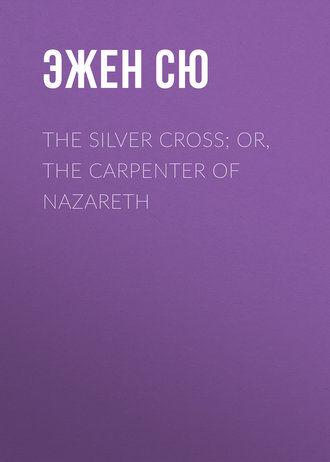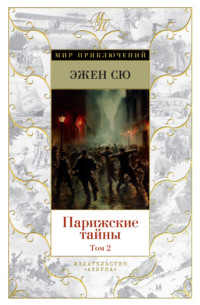
The Silver Cross; Or, The Carpenter of Nazareth
He frequently stooped down to kiss some ragged little children who held the lappets of his robe, and, smiling ineffably, he said to those who surrounded him:
'Let the little children approach me.'
Judas, a man with a sinister and deceptive countenance, and Simon, other disciples of Jesus, accompanied him and carried each of them a box, in which the son of Mary, after questioning each patient and attentively listening to his reply, took several medicaments which he gave to the infirm and to the women who came to consult his science, either for themselves or for their children.
Frequently, to the balsams and advice he distributed, Jesus added a gift of money, which he drew from the bag at his girdle; he so often dipped into this purse, that having a last time plunged in his hand, he smiled mournfully on finding the little pocket empty. So, after turning all manner of ways, he made a sign of touching regret, as if to show that he had nothing to give. Then, those whom he had assisted with his counsels, his balms, and his money, thanked him warmly; he said to them in his gentle voice:
'‘Tis Almighty God, the Father of us all, who is in Heaven, that you must thank, and not me – peace be with you.'
'If your treasury of money is empty, friend, you have still an inexhaustible treasure, that of good words,' said Banaias; for he had contrived to approach quite close to Jesus of Nazareth, and he contemplated him with a mixture of respect and emotion that made his ferocious traits forgotten.
'Yes,' replied another; 'tell us, Jesus, of things which we poor and humble can comprehend, the language of our holy and divine prophet, but often obscure to us poor people.'
'Oh, yes; our good Jesus,' added a pretty child, who had glided into the front rank, and held one flap of the robe of the young man of Nazareth, 'recount to us one of those parables that delight us so much, and which we repeat to our mothers and brothers.'
'No, no,' said other voices; 'before the parable, make one of your noble discourses against the wicked rich, the powerful and the proud.'
But Mary's son pointed with a smile to the little child who had first demanded a parable, and took him on his knees, after seating himself near a table; thus showing his love for infancy. Mary's son seemed to say that this dear little one should be first satisfied in his desire. All, then, grouped round Jesus; the children who loved him so sat down at his feet; Oliba and other courtezans also seated themselves on the ground in the Eastern fashion, embracing their knees with their hands, and their eyes fixed on the young man of Nazareth, in anxious expectation. Banaias, and several of his like, crowding behind the young man, recommended silence to the eager multitude. Others, lastly, more distant, such as Jane, Aurelia, and her slave Genevieve, formed a second rank by mounting on the benches. Jesus, still holding on his knee the little child, who with one of his tiny arms resting on the shoulder of the son of Mary, seemed suspended from his lips, commenced the following parable: 'A man had two sons, and the younger of them said to his father: 'Father, give me the portion of goods that falleth to me.' And the father divided his goods. A short time after, the youngest of the sons gathered together all he had and went into a distant country and dissipated his portion. And after he had spent all, a great famine arose in the land, and he began to be in want. He therefore went into service with an inhabitant of the country, who sent him into the fields to feed swine. There he would willingly have filled his belly with the husks the swine did eat, but no man gave unto him.'
At these words of the parable the child which Mary's son held upon his knees uttered a deep sigh, joining his little hands in a pitying manner. Jesus continued:
'At length returning to himself, the prodigal son said, "How many servants of my father have bread enough and to spare, and I perish of hunger? I will arise and go to my father, and will say unto him: father, I have sinned against heaven, and before thee, and am no more worthy to be called thy son: make me as one of thy hired servants." And he arose and went to his father; but when he was yet a great way off, his father perceived him, and moved with compassion, he ran to him and fell on his neck and kissed him.
'And his son said to him: "My father, I have sinned against heaven and in thy sight, I am no more worthy to be called thy son."
'But the father said to his servants:
"Bring forth the best robe and put it on him; and put a ring on his finger and shoes on his feet; and bring hither the fatted calf and kill it; and let us eat and be merry; for this my son was dead, and is alive again; he was lost, and is found."
'Oh! the kind father!' said the child on the knees of Jesus. 'Oh! the good and tender father, who pardons and embraces instead of scolding!'
Jesus smiled, kissed the child's forehead, and continued:
'And they began to be merry. But the elder brother, who was in the field returned, and when he came near the house, he heard music and dancing. He therefore called one of the servants, and asked what all this meant. The servant replied to him:
"Thy brother is come, and thy father hath killed the fatted calf, because he hath found him safe and sound;" which made the elder brother angry, and he would not go in; therefore his father came out and entreated him. But his son replied to him: "These many years have I served thee, neither have I at any time transgressed thy command; and yet thou never gavest me a kid that I might make merry with my friends. But as soon as this, thy son, who has squandered his living with harlots, is returned, thou hast had the fatted calf killed for him."'
'Oh! how wicked is the eldest son!' said the child; 'he is jealous of his poor brother, who returns, however, very unhappy to the house. God will not love this jealous son; will he, my good Jesus?'
Mary's son shook his head, as if to reply to the child that the Lord did not indeed love the jealous: he then continued, —
'But the father said to the son: "My son, thou art always with me, and all that I have is thine; it was fit that we should make merry and be glad; for this, thy brother, was dead, and is alive again; was lost, and is found."'
All who were present seemed moved to tears at this recital. Mary's son having stopped to drink a glass of wine, which Judas, his disciple, poured out for him, Banaias, who had listened to him with profound attention, exclaimed: 'Friend, do you know that this is very much my own history, and that of many others. For if, after my own first folly of youth, my father had imitated the father in your parable, and had tendered me his hand as a sign of pardon, instead of driving me from the house with his stick, I should be at this hour, perhaps, seated at my honest fireside, in the midst of my family; whereas, now my home is in the highway, misery my wife, and my children evil projects, sons of misery, that mother with the ferocious eye. Ah! why had I not for a father the man in the parable?'
'This indulgent father pardoned,' replied Oliba the courtezan, 'because he knew that God, having given youth to his creatures, sometimes abuse it; but those who, reviled, miserable and repentant, return humbly to demand the smallest place in the paternal mansion, these, far from being repulsed, ought they not to be received with pity?'
'I,' said another, 'would not give a grapestone for this elder brother, this man of wealth, so harsh, so coarse, and so jealous, to whom virtue costs nothing.'
Genevieve heard one of the two emissaries of the Pharisees say to his companion, 'The Nazarene pretty well flatters the bad passions of these vagabonds. Henceforth, every debauched idler who may quit the paternal mansion will think himself entitled to send his father to Beelzebub, if the father, wrongly advised, instead of killing the fatted calf, drives from him, as he ought, this villainous son, whom hunger alone brings back to the fold.'
'Yes; and all the honest and prudent will pass for men of hard heart and jealous.'
And the man resumed aloud, thinking that no one would know who it was that thus spoke: 'Glory to thee, Jesus of Nazareth, glory to thee, the protector, the defender of us dissipaters and prostitutes! It is folly to be wise and virtuous, since the fatted calf is to be killed for the most debauched.'
Loud murmurs acknowledged these words of the emissary of the Pharisees; all turned round whence they had been pronounced; threats were heard:
'Hence! away with these men of inexorable heart!'
'Oh! these men are without pity, without mercy, repentance does not touch them,' said the courtezan Oliba; 'these frozen bodies who cannot comprehend that with others the blood boils!'
'Let him who has thus spoken show himself,' exclaimed Banaias, striking the table with his heavy, knotted stick in a threatening manner, 'yes, let him show his virtuous face, the scrupulous! more severe than our friend of Nazareth, the brother of the poor, the afflicted, and the suffering, whom he supports, heals and consoles! By the eye of Jerobabel! I should like to look him in the face, this white lamb without spot, who comes here to bleat his virtues. Where is he, then, this immaculate lily of the valley of men? He must smell of good, like a real balm,' added Banaias, opening his wide nostrils; 'and by the nose of Malachi! I don't smell at all this aroma of wisdom, this perfume of honesty, which ought to betray the choice odoriferous vase hidden amongst us poor sinners.'
This pleasantry of Banaias made the auditory laugh excessively; and the one of the two emissaries who had thus attacked the words of Jesus, seemed in no hurry to gratify the desire of the redoubtable friend of the Nazarene; he feigned, on the contrary, as well as his companion, to search, like the rest of the audience, from whence the words had proceeded. The tumult was increasing, when the young Nazarene made a sign that he wished to speak; the tempest was appeased as if by enchantment; and replying to the reproach of being too indulgent to sinners, Jesus said with an accent of severe mildness: 'Who amongst you possessing a hundred sheep, and losing one, would not leave in the plain the ninety-and-nine others, to go and seek that which is lost, until he had found it? When he has found it he brings it back with joy on his shoulders; and having returned to his house, he assembles his friends and neighbors, and says to them, "Rejoice with me, because I have found my sheep that was lost."'
'And I say unto you,' added Mary's son in a voice filled with grave and tender authority, 'and I say unto you there shall be more joy in heaven for one sinner that repenteth, than for the ninety-and-nine just men, who need no repentance.' – These touching words of Jesus made a lively impression on the crowd; it applauded in words and gestures. – 'Reply to that, my white lamb! my lilly without a stain!' said Banaias, addressing the invisible interpreter of the Nazarene.
'If you are not of the same opinion as my friend, approach and maintain your words.'
'A grand merit, as Jesus says,' observed another; 'a grand merit for him who has neither hunger nor thirst, to be neither a glutton nor a drunkard!'
'Virtue is easy to her who has every thing,' said the courtezan Oliba, 'hunger and privation ruin more women than dissipation.'
Suddenly there was a tumult amongst the crowd that filled the tavern, and the name of Magdalen was heard pronounced.
'She is one of the creatures who make a traffic of their bodies,' said Jane to Aurelia; 'it is not misery that has thrown her, like so many others, into this degradation; but a first fault, followed by the desertion of him who seduced her, and whom she adored. Since then, despite the disorders of her life and the venality of her amours, Magdalen has proved that her heart is not entirely corrupted. The poor never beseech her in vain, and she has passionately loved some men with a love as devoted as it was disinterested, sacrificing to them high priests, doctors of the law and rich seigneurs, who rivalled each other in their gifts; my husband, with others, was amongst the number of these magnificent lovers.'
'He has expended upon Magdalen a great deal of money; she is so handsome,' continued the young woman, with an indulgent smile. 'He is one of those who have enriched her. They tell wonders about her house, or rather the palace she inhabits; her coffers are filled with the rarest stuffs and the most dazzling jewels. Vases of gold and silver, brought at great expense from Rome, Asia, and Greece, encumber her sideboards; the purple and silk from Tyre adorn the walls of her dwelling, and her attendants are as numerous as those of a princess.'
'We, too, have in Italy and Roman Gaul, some of these creatures, whose insolent luxury insults the moderate fortune of many honest women,' replied Aurelia. 'But what can this Magdalen want with the young Nazarene?'
'No doubt she comes, like many of the same sort whom you see here, less rich than her, but not less degraded, to hear the words of Jesus; those gentle and tender words that penetrate the heart by the mercy they breathe, softens it, and makes it bring forth repentance.'
'Here!' said several voices: 'room for Magdalen, the handsomest amongst the handsomest!'
'The queen of us all!' said Oliba's companion to her with a lofty air: 'for indeed Magdalen is the queen of us all!'
'A sad royalty!' replied Oliba, sighing: 'her shame is seen from the highest to the most distant!'
'But she is so rich! so rich!'
'To sell oneself for a penny, or a mountain of gold,' replied the poor courtezan, 'where is the difference? the ignominy is the same!'
'Oliba, you are getting completely mad!'
The young woman made no reply, but sighed. Genevieve, mounted, like her mistress, on a stool, raised herself on the points of her toes, and soon saw the celebrated courtezan enter the tavern.
Magdalen was possessed of a rare beauty; the chin-piece of her turban of white silk edged with gold, encased her pale and swarthy face of an admirable perfection; her long eye-brows, as black as ebony, like the bands of her hair, appeared as a dark line along the brow hitherto superb and brazen; but now, mournful and depressed, for she seemed completely heart-broken. The ends of her eye-lashes, stained with a blue color according to the oriental fashion, gave to her eyes, drowned in tears, something strange, and seemed to double the grandeur of her orbs, sparkling through her tears like two diamonds.
A long robe of Tyrian silk of shaded blue, edged with gold and embroidered with pearls, fell in a long train behind her, and round her waist she had a flowing scarf of cloth of gold covered with stones of many colors, like those of the double necklaces, ear-rings and bracelets, with which her bare and well-shaped arms were covered; and thus attired, holding in her hands an urn of pink alabaster from Chaldea, more precious than gold, she advanced quite slowly towards the young man of Nazareth.
'What a change in Magdalen's traits,' said Jane to Aurelia. 'I have seen her pass a hundred times in her litter, carried by her attendants, dressed in rich liveries; the triumph of beauty, and the intoxication and joy of youth could be read in her countenance. And she is timidly approaching Jesus, humble, oppressed, weeping, and more sorrowful than the saddest of the poor women who hold in their arms their ill-clad infants.'
'But what is she about?' inquired Aurelia, more and more attentive; 'she stands before the young man of Nazareth; in one hand she holds her alabaster urn pressed against her agitated bosom, whilst with the other she detaches her rich turban. She throws it far from her. Her thick and glossy tresses fall over her breast and shoulders, unroll themselves like a velvet mantle and even trail on the ground.'
'Oh! look! look! her tears redouble,' said Jane; 'her face is drowned in them.'
'She kneels at the feet of Jesus,' continued Aurelia, 'and covers them with tears and kisses.'
'What heart-rending sobs!'
'And the tears she sheds on the feet of Mary's son she wipes away with her long hair.'
'And now, still melting in tears, she takes her alabaster urn and empties over the feet of Jesus a delicious perfume, the scent of which reaches here.'
'The young master endeavors to raise her; she resists; she cannot speak; her sobs break her voice; she bends down her lovely head to the very ground.'
Then Jesus, who could scarcely restrain his emotion, turned towards Simon, one of his disciples, and addressing him: 'Simon, I have something to say to you.'
'Speak, master.'
'A creditor had two debtors; the one owned him five hundred pence, the other fifty. As they had not wherewith to pay him, he remitted to both their debt; tell me, then, which of these two should love him most?' Simon replied: 'Master, I think it should be he to whom he forgave the most.'
'Thou hast judged rightly, Simon.' And, turning to the rich courtezan still kneeling, Jesus said to those present: 'Do you see this woman? I declare to you that her many sins are forgiven her, because she loved much!' He then said to Magdalen, in a voice full of tenderness and pardon: 'Thy sins are forgiven thee – thy faith hath saved thee; go in peace.'
'Abomination of desolation!' said the emissary of the pharisees half aloud to his companion: 'can audacity and demoralization go further? Why, the Nazarene pardons all that is blameable, relieves all that is vile; after reinstating dissipation and prodigality, behold him now reinstating the most notorious courtezans.'
'And why?' said the other emissary, 'that he may still flatter the vices and detestable passions of the wretches he draws round him, whom he will one day make his instruments.'
'But patience,' observed the first, 'patience, Nazarene, thy hour approaches; thy still increasing audacity will soon draw down upon thee a terrible punishment!'
Whilst Genevieve listened to the two wicked men thus conversing, she saw Magdalen, after the affectionate words of Jesus, rise up radiant; the tears chased each other down her handsome face, but these tears no longer seemed bitter. She distributed to all the poor women who surrounded her, her precious stones and jewels, unfastened even to the magnificent robe she wore over her tunic of fine cloth from Sidonia, and put on the mantel of coarse brown wool of a young woman to whom she gave in exchange a rich robe embroidered with pearls of great value. She then said to Simon, that she would not again quit these humble garments, and that on the morrow all her wealth should be distributed to poor families, and to the courtezans whom misery alone prevented returning to a better life.
At these words Oliba, joining her hands in a burst of gratitude, threw herself at the feet of Magdalen, took her hands, kissed them whilst sobbing and said to her —
'Blessed be thou, Magdalen! oh, blessed be thou! Thy bounty hath saved me, me and so many of my poor companions of shame; but we repented at the voice of the son of Mary; that voice penetrated our hearts; we hoped for pardon. But, alas! the necessity of living retained us in wickedness and contempt. Blessed be thou, Magdalen, thou who renderest possible our return to good.'
'Sister, it is not I you must bless,' replied Magdalen; '‘tis Jesus of Nazareth; his words inspired me.'
And Magdalen mingled amongst the crowd to listen to the words of the young master.
Some of his disciples having said in speaking to him of Magdalen, that she had been seduced and then abandoned by a young doctor of the law, the figure of Jesus became grave, severe, and almost menacing, and he exclaimed —
'Woe to you, doctors of the law! Woe to you, hypocrites! You are like unto whitened sepulchres; the outside appears gay, but within all is bones and putridity. Thus, outwardly you appear just in the eyes of men, but inwardly you are full of iniquity and hypocrisy. Woe to you blind leaders who take great care as to what you drink, lest you should swallow a camel.'
This familiar satire made several of the auditory smile, and Banaias exclaimed —
'Oh, but you are right, my friend. How many of these swallowers of camels we know. But such is the sharpness of their conscience that they digest these camels as the ostrich digests a stone, and nothing appears of it.'
Fresh bursts of applause replied to the pleasantry of Banaias, and Jesus resumed:
'Woe to you, Pharisees! woe to you who cleanse the outside of the cup while within it is all rapine and impurity.'
'It is true,' replied several voices; 'these hypocrites clean the outside because the outside alone is seen.'
The son of Mary continued:
'Woe to you, Pharisees! who preach what you ought to do, but do it not! Woe to you who make heavy and insupportable burthens, place them on the shoulders of men, but will not touch them with your finger.'
This new comparison struck the mind of the auditors of the young master, and several voices again exclaimed:
'Yes, yes, these idle hypocrites say to the humble, "Work is holy; work, work, but we will not work. Yes, bear alone the burthen of the labor, but we rich will not touch it with the end of our finger."'
Jesus continued: —
'Woe to you who do all your actions that you might be seen of men. It is for this that you carry long bands of parchment, on which are written the words of the law, which you do not practice. Woe to you who say, "If a man swears by the temple it is nothing, but if he swears by the gold of the Temple, he is bound by his oath."'
'Because for these rich wicked ones,' said a voice, 'nothing is sound but gold. They swear by their gold as others swear by their soul or by their honor.'
'So that if a man swears by the altar it is nothing,' pursued Jesus; 'but whoever swears by the offering that is on the altar, he is bound by his oath. Woe to you, hypocrites! who pay scrupulously the tenth, but who deny that which is more important in the law, justice, mercy, and good faith. These were the things you should practice, without omitting the others.'
'By the two thumbs of Methusalem!' exclaimed Banaias, laughing, 'you appear at ease, friend. As these hypocrites have in their coffers enough to pay the tithe without inconveniencing themselves, and they pay it; but where would you have them find this money of justice, of good faith, and of mercy, which you demand from these whitened sepulchres, from these swallowers of camels of iniquity, as you will so call them?'
'Alas! the young master says true,' observed another; 'for him who has no money justice is deaf. The doctors of the law do not say to you at their court, "What good grounds have you? but, how much money will you promise me?"'
'I had confided a few savings to Jonas, a high priest,' said a poor old woman; 'he told me he had expended the money in offerings for my salvation. What could I do, a poor woman against so powerful a seigneur? resign myself and beg for bread, which I do not find every day.'
At this complaint, Jesus exclaimed with increased indignation, 'Oh! woe to you hypocrites: because, under pretence of your long prayers you rob the widow of her mite. Woe to you, serpents, race of vipers! how will you escape being condemned to the fire of hell? It is for this I will send to you prophets and sages to save you.'
'But, alas!' added the son of Mary with an accent of much sorrow, 'you will kill the former; you would crucify the latter; you would persecute them from town to town, that all the innocent blood that has been shed upon the earth may return upon you – from the blood of Abel the just to the blood of Zachariah, whom you killed between the Temple and the altar!'
'Oh! fear nothing, friend! if these swallowers of camels wish to shed your blood,' exclaimed Banaias, striking the hilt of his large rusty cutlass, 'they must first shed ours, and we await them.'
'Yes, yes,' replied the crowd, in one voice, 'fear nothing, Jesus of Nazareth, we will defend thee!'
'We will die for thee if necessary!'
'You shall be our chief!'
'Our king!'
But the son of Mary, as if he mistrusted these transports, shook his head with a sadness more and more profound; tears streamed down his cheek, and he exclaimed, in a disconsolate voice:
'Oh! Jerusalem! Jerusalem! thou who killed the prophets! thou who stone the wise men that are sent to thee! how often have I striven to assemble thy children, as a hen gathers together her little ones beneath her wings, and thou would'st not; no, thou would'st not!'









